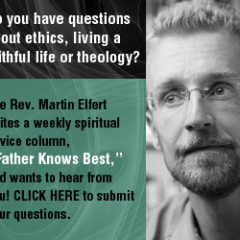Do you have a question about life, love, or faith? Submit it online, fill out the form below or email it to melfert@stjohns-cathedral.org.
Hey Rev!
Can you recommend a book that explains why the Jews are wrong to follow the Law?
– Chris
No.
A few years back I heard a rabbi speak. He told us something that I have thought of often since then.“People assume,” he said, “that following the Law is a burden, that it’s a chore. But actually,” he went on, “it’s a joy.”
I think that joy is where we need to begin, Chris. Because human beings are wired in a way that makes it pretty easy for us to assume that people who encounter and respond to reality differently than we do are profoundly mistaken, that they are lost, that they are laboring under a painful and maybe even an immoral delusion. It’s pretty easy for us to look at such folks and say to ourselves: if only. If only those people knew what I knew, if only they behaved how I behave, if only they believed what I believe — well, their shackles would fall away. They’d be happy. They’d be free.
Now, I guess it’s possible that there are Jewish folks who really are suffering under the Law, who are frantically following it in the hopes that God will like them — much as I guess that there are Muslims and Buddhists and Christians who are enduring a painful faith out of the sense that, like some awful exercise class, it must be doing them good. (I’d quit if I could, but I’ve paid the membership fees for the rest of my life.) But you know what? I don’t know a whole lot people like that.
Most of the people I know who are part of Judaism (or, for that matter, who are part of another religious tradition) have chosen its practices, its rhythms, its beliefs — and, yes, even its restrictions — because these things nurture in them the very joy of which that rabbi spoke. Faith is a vocation that invites us to most completely become ourselves. Like a lot of vocations (think of parenthood, of marriage, of other acts of service), faith limits us even as it sets us free. It constrains us even as it draws us into joy.
Here is joy through the calling to serve neighbor and creation. Here is joy through the assurance that we are loved. Here is joy through rituals and symbols which have sustained generations through days of celebration and of suffering. Here is joy through the promise that our lives matter and that our work has meaning.
The notion that following the Law is a mistake, that it somehow leaves one adrift and maybe even alienated from God, is a caricature that will rarely survive an actual friendship with a practicing Jew. And here, Chris, waits your challenge: are you willing to risk entering into such a friendship? Are you willing to risk giving up the reassuring safety of stereotype in exchange for the messiness and the glorious ambiguity of actual relationship? Are you willing to risk the possibility that, even though a faithful Jew’s path may look seriously different than your own, it might still lead to the big love that we call God?
There are two reasons, Chris, that I hope that you can find your way to answering those questions with a “yes.” First, hanging out with Jewish people will deepen your understanding of what God is like, of how and where God is speaking. A visit to a synagogue or a temple, for instance, will expose you to different ways of praising the divine. It will encourage you to think about why you believe what you believe, why you do what you do. It will challenge you to critique your own faith even as it deepens your love for it.
Second, you may find that letting go of the need for Jews or people of other traditions to be wrong about their beliefs will let you set down a big weight. There is something draining, something burdensome, when we craft identifies for ourselves that are predominantly (or even significantly) built around negation. I’m excited about talking with you about how knowing and loving Jesus is a transformative gift: I couldn’t be less interested in talking about how folks who aren’t Christians have made a mistake.
With God’s help, Chris, you will get to that place of “yes.” You may be surprised and even delighted by the joy that you find there.










Well said Martin. There is often more joy in the taste of one orange than a thousand at the table. A life devoted to learning to play the piano isn’t a limit of joy but a discipline that produces beautiful music.
I guess I’m suprised that no one thought of the Bible. I know it’s more like an anthology, but Paul’s letter to the Romans is judged by many as the most amazing treatice on law versus grace ever. Everywhere in the NT trying to follow the law is declared to be trying to establish our own righteousness when Jesus suffered and died a cruel death to purchase the only righeousness acceptable to God, in order to offer it to us as a free gift.
Feeling good about ourselves is not the point, it’s whether God can accept our law works, and it’s not me that has anything to say about it, it’s Him, and He says absolutely not. A real friend does not leave his friend believing he is ok when he’s not. I agree that loving your friend and praying for the right opportunities to share the truth in the right way is crucial, but the tone of the answer seems to say there is never a need.